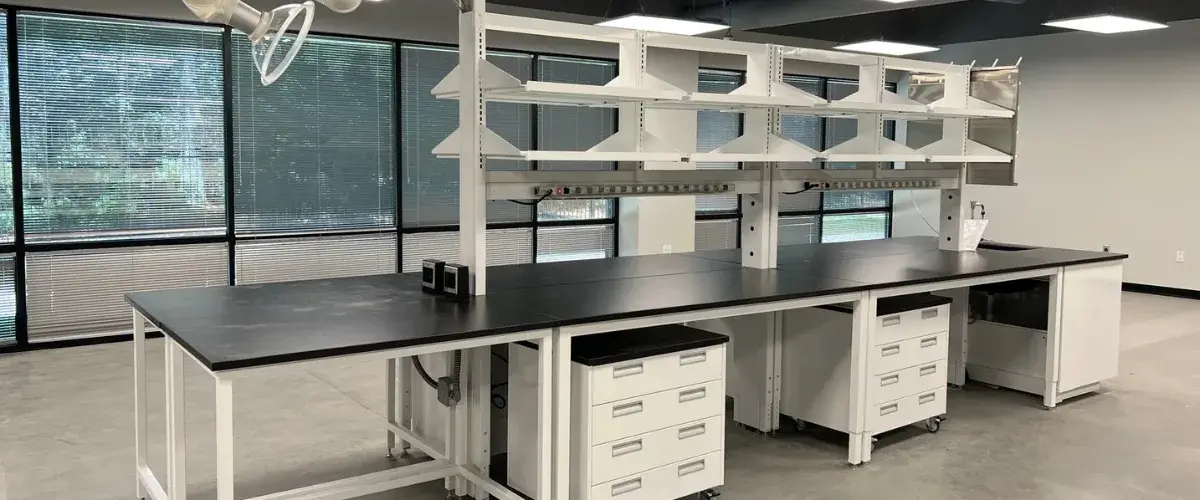

2025 Lab Design Trends: As technology advances and industries evolve, laboratories must be designed to keep up with the ever-changing landscape. In this blog, we will discuss several trends shaping the future of laboratory environments, focusing on adaptability, sustainability, and the integration of cutting-edge technology.
Flexible and Modular Lab Spaces
Gone are the days of confined lab spaces. Modern laboratories demand versatility to accommodate changes in procedures, research, and processes. Modular lab furniture, mobile worktables, and casework allows for spaces to reconfigure easily, catering to evolving research and technological advancements.
Sustainable and Eco-Friendly Design
Sustainability is important in laboratories. Growing emphasis on energy efficiency and environmentally friendly materials, labs are incorporating LED lighting, advanced HVAC systems, recyclable, LEED-certified or low-impact materials, such as epoxy resin countertops, stainless steel casework and tops, and plastic laminate (in certain areas). Energy recovery systems and water-efficient lab equipment are becoming standardized as well.
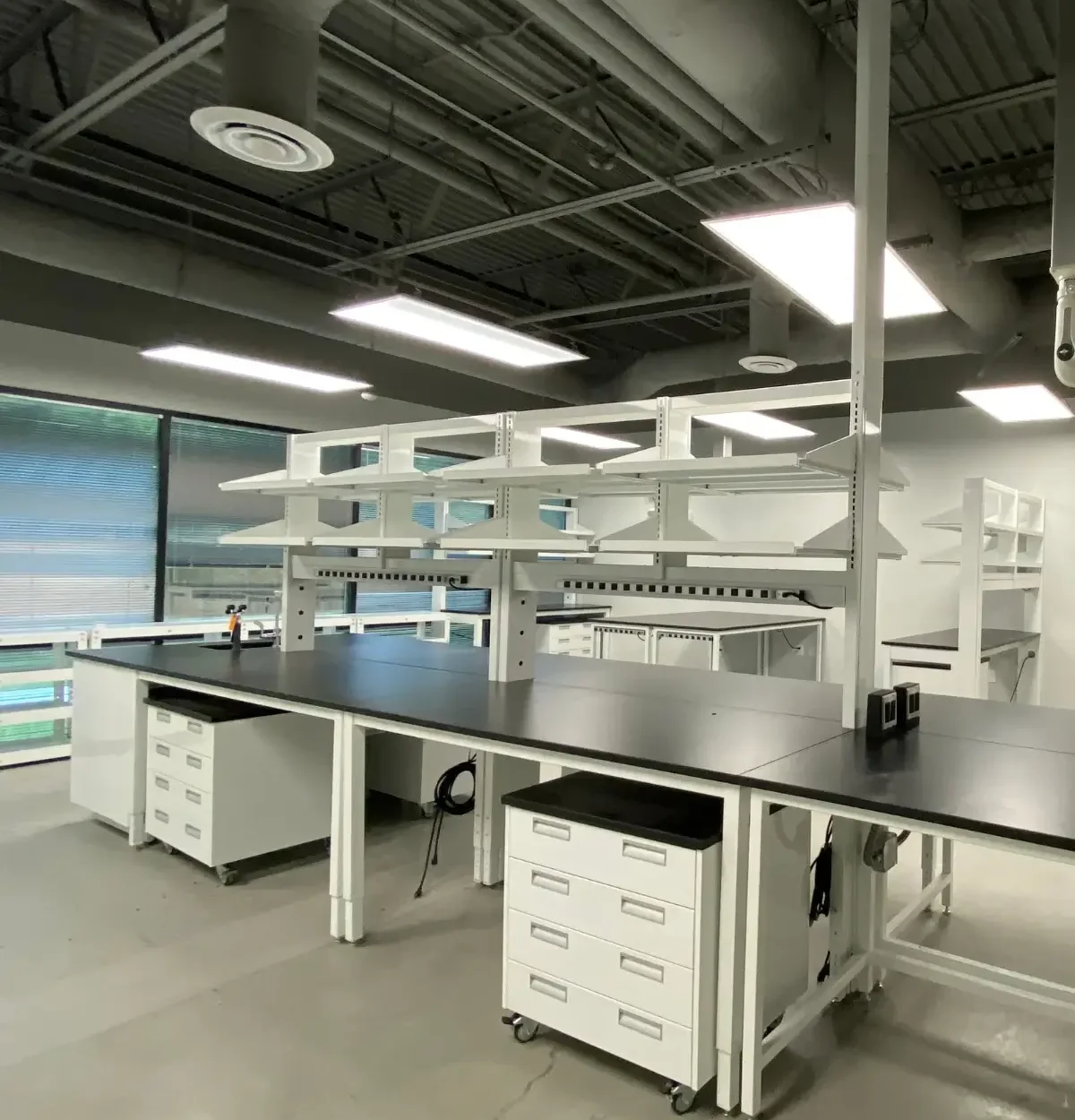
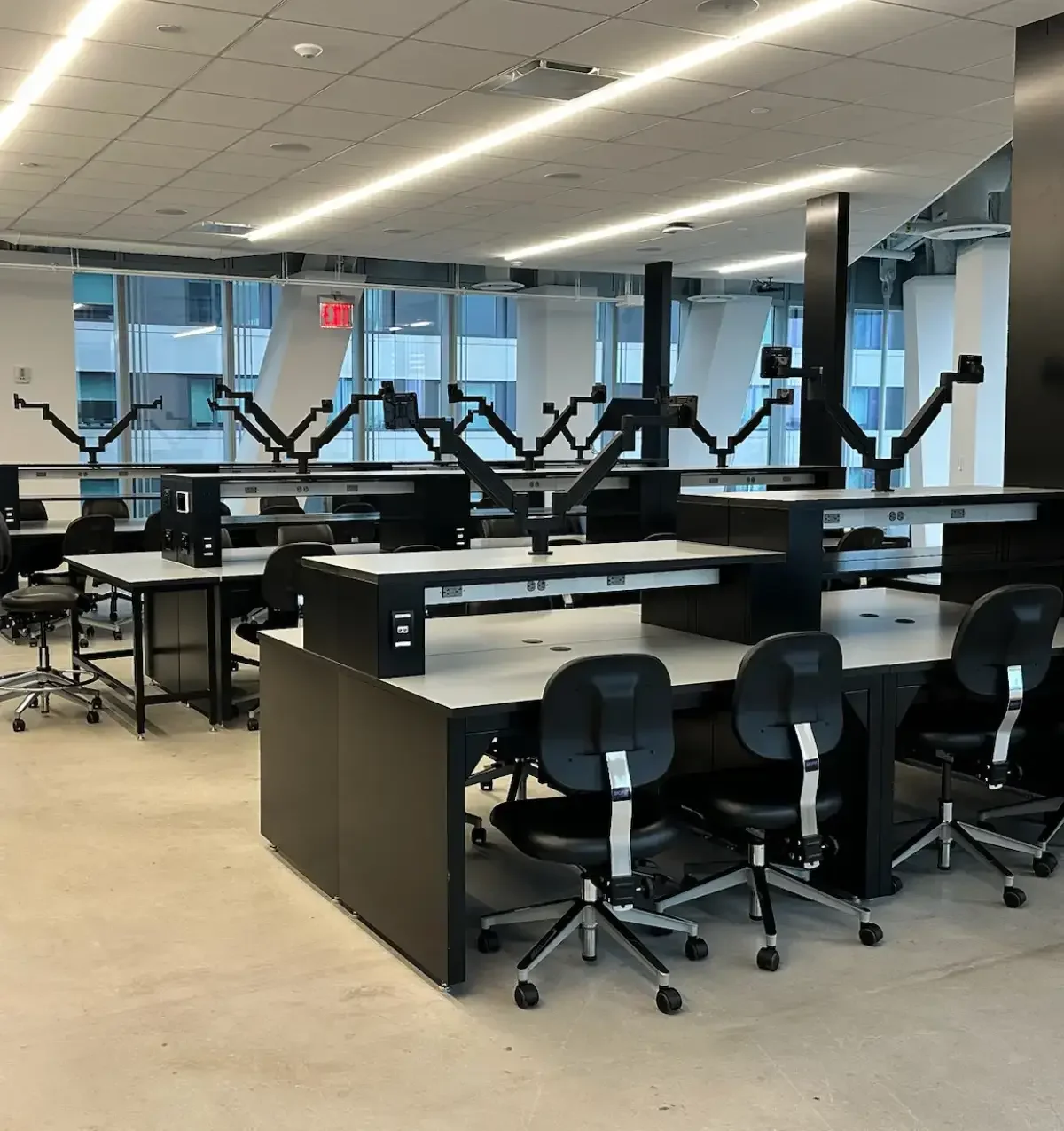
Smart Labs with Integrated Technoloy
The growth of IoT (the Internet of Things) and AI (artificial intelligence) has led to the development of “smart” labs. In 2025, laboratories are using IoT-enabled equipment, AI-driven data analysis, and automated systems for monitoring temperature, humidity, and safety compliance. These elements enhance efficiency, reduce errors, and improve overall lab management.
enhanced safety and ergonomics
With different laboratory design trends coming and going, safety has always been a consistent priority. Tailor-made ergonomic furniture, corrected airflow systems, and progressive hazard detection sensors are being incorporated into modern laboratories. Not to mention, touchless technology, such as automated doors and voice-activated equipment, decreases cross-contamination risks and improves user comfort.
Hybrid Workspaces and Collaboration Areas
Since the pandemic, hybrid work and collaborative spaces should not be left out of discussion for labs. Areas for virtual meetings, team discussions, and remote monitoring of experiments promote seamless collaboration between on-site and remote researchers.
3D Printing and Custom Fabrication
3D printing has evolved beyond basic shapes and models. Additive manufacturing is revolutionizing laboratory equipment and furniture design. Using 3D printing for intricate lab components, custom tools, and even prototyping research materials, this technology allows for rapid adaptation and cost-effective customization.
Biophilic and well-being-focused design
Modern laboratories are encompassing employee well-being by factoring biophilic design principles. Using natural lighting, addition indoor plants, and improved ventilation improve productivity and reduce stress. This cultivates more inviting and comfortable workspaces, leading to better work conditions for researchers and job satisfaction.
Increased USe of Stainless STeel Casework
With the demand for durability and cleanliness, stainless steel casework has become a top choice for laboratories. With its non-porous, anti-bacterial features and longevity, stainless steel is ideal for sterile environments, like cleanrooms and biosafety labs.
However, stainless steel is still an expensive option, and with its many benefits and advantages, the cost can be deterring. An alternative is powder-coated steel. Still non-porous, easy to clean, and a fraction of the costs when compared to stainless steel, but it’s best to see what material is most appropriate for the lab space. Not all labs need stainless steel, yet some require that higher quality material due to the nature of experiments and processes.
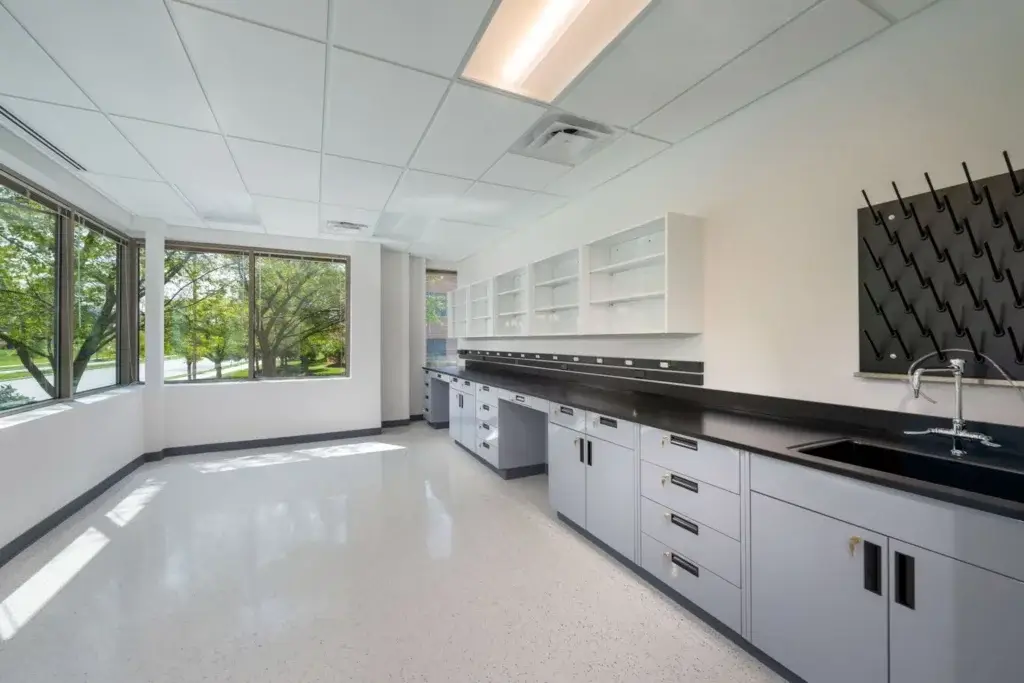
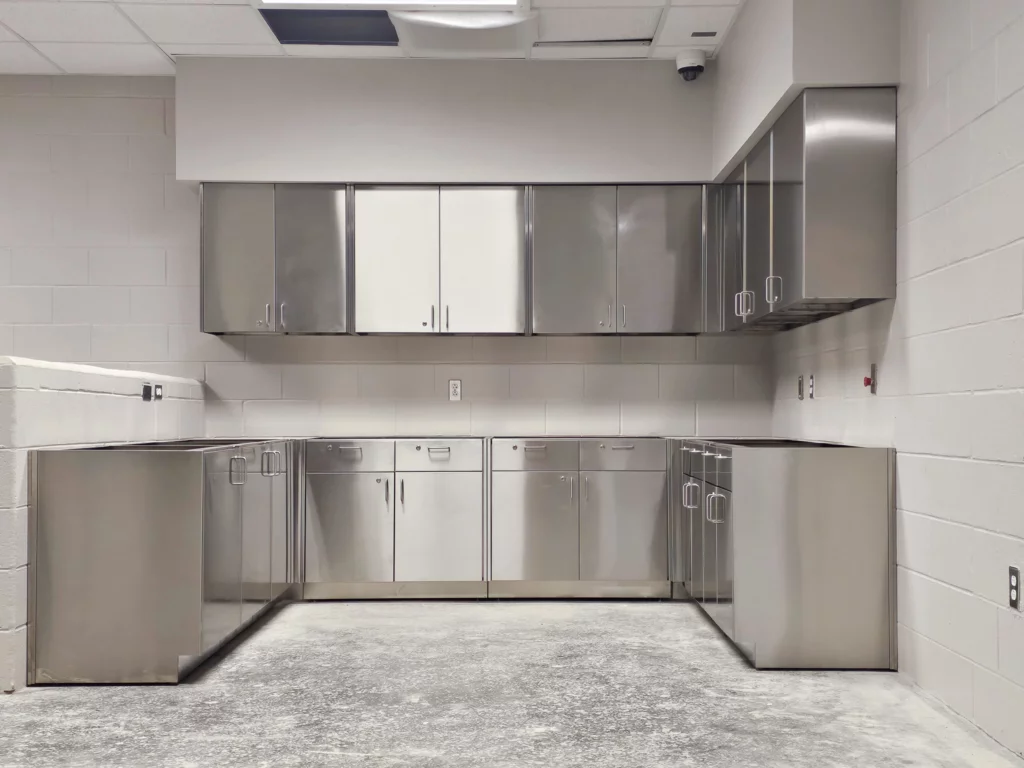
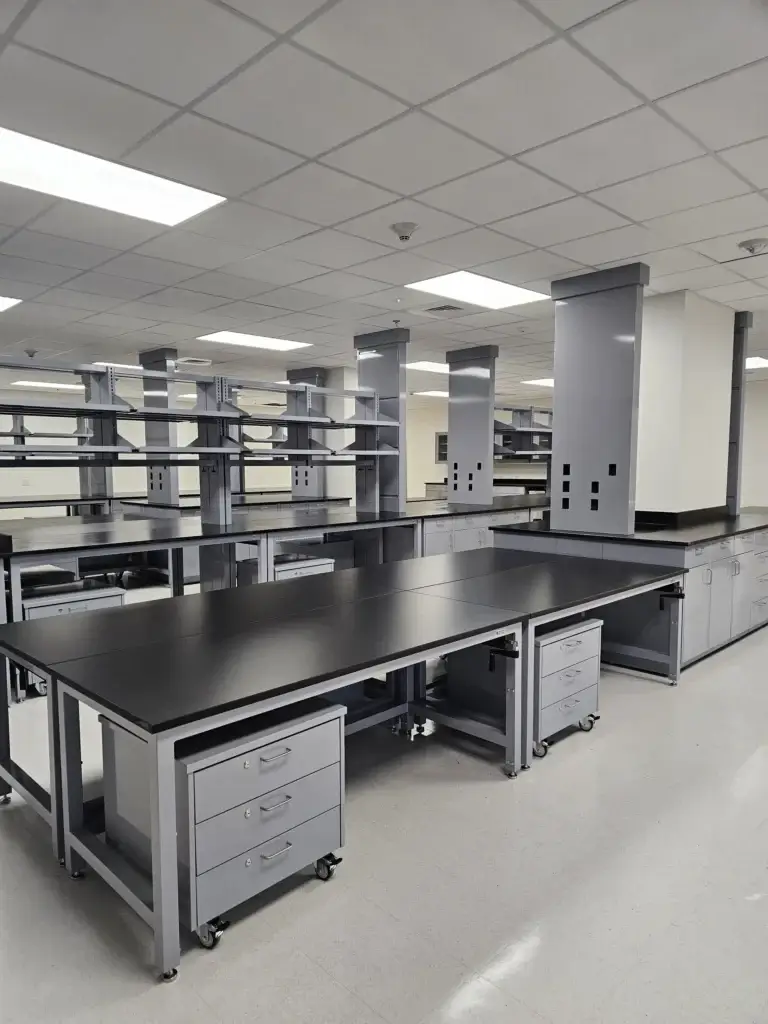
specialized spaces for the emerging research fields
Aside from traditional lab fields like chemistry, biology, and pathology, new scientific fields are emerging. Fields like synthetic biology, nanotechnology, and quantum computing, along with other specialized sectors, need labs designed to match their unique requirements. This can include, but is not limited to, ultra-clean rooms, enhanced biosafety labs, and cryogenic storage facilities.
augmented reality (AR) and virtual reality (VR) in Lab Training
Artificial Reality (AR) and Virtual Reality (VR) technologies are also transforming laboratory training and research. Labs are integrating immersive training simulations for safety procedures, equipment usage, and complex experiments. Reducing errors, enhancing learning, and ensuring compliance with industry standards
Future-proofing laboratories
Laboratories will change with the demands of science and researchers. Regardless of flexible layouts, automation, and user comfort, the end goal is to design and create highly functional labs that foster innovation and efficiency.
At OnePointe Solutions, we can help you with designing modern lab layouts and manufacturing optimal laboratory furniture, like stainless steel casework, mobile lab tables, and custom lab solutions to fit your lab. Contact us today to speak to rep to get started on your laboratory design.


